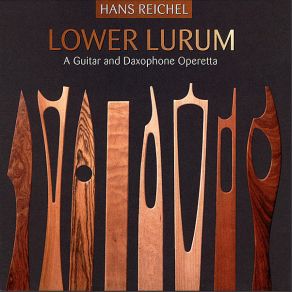Lower Lurum
Download links and information about Lower Lurum by Hans Reichel. This album was released in 1995 and it belongs to Electronica, Dancefloor, Dance Pop, Alternative genres. It contains 27 tracks with total duration of 01:01:36 minutes.

|
|
|---|---|
| Artist: | Hans Reichel |
| Release date: | 1995 |
| Genre: | Electronica, Dancefloor, Dance Pop, Alternative |
| Tracks: | 27 |
| Duration: | 01:01:36 |
| Buy it NOW at: | |
| Buy on iTunes $9.99 | |
Tracks
[Edit]| No. | Title | Length |
|---|---|---|
| 1. | Upper Larum | 4:04 |
| 2. | Prelude to "Onkel Boskopp" (II) | 1:19 |
| 3. | Jealousy and Goodness | 1:37 |
| 4. | ...Continued | 0:39 |
| 5. | Melmoth the Wanderer | 1:27 |
| 6. | For Those Who Love Propellers | 2:57 |
| 7. | The Little Waltz | 1:48 |
| 8. | Mr. and Mrs. Alcohol | 1:55 |
| 9. | I Want You to Be Happy | 3:10 |
| 10. | A Mission That Failed | 3:02 |
| 11. | Good That We Have Guitar Players | 2:18 |
| 12. | Please Let Me Be Your Message | 0:35 |
| 13. | In Harmony With Henry the Horse | 2:08 |
| 14. | Dining Out At the Shivering Szechuan | 2:29 |
| 15. | Feeding the Hans Who Laughs | 2:15 |
| 16. | Arrival of the Midnight Queen | 2:29 |
| 17. | Prelude to "Onkel Boskopp" (III) | 2:24 |
| 18. | Hohou Speaks | 1:53 |
| 19. | Telling the Truth About K Minor | 5:37 |
| 20. | Innocense Not Permitted In This Area | 1:10 |
| 21. | Bap & the Tists | 0:36 |
| 22. | You May Leave a Cheque | 2:10 |
| 23. | We've Deserved Some Sweets, But | 1:13 |
| 24. | Bad Teeth In Marlboro Country | 3:13 |
| 25. | Prelude to "Onkel Boskopp" (I) | 4:11 |
| 26. | Dating At the Upper Larum | 1:52 |
| 27. | Lower Lurum | 3:05 |
Details
[Edit]Hans Reichel's Lower Lurum is perhaps the record that introduced the world to his invention, the daxophone, a box playing a long, thin altered board that produces so many tones and sounds they are virtually limitless. Add to this Reichel's homemade guitars, which are truly exotic pieces of art as well as functional instruments, and you have an orchestra from another dimension. Which is what Lower Lurum is pretty much all about. Being subtitled as a "guitar and daxophone" operetta, in Reichel's mind there is probably a concept here. But that concept for the listener — especially since there are no notes explaining what the "plot" of this operetta is supposed to be — is tonal. Given how technical Reichel is about everything in the booklet, it is — for those who've never heard Reichel's music — shocking to hear its emotional warmth, depth, and humor. There is very little manipulation of sound with overdubs occurring in very few places, and even they are used sparingly. This is music that comes straight through the microphone without effects. In large part this is because it doesn't need any. Reichel's operetta and his music in general are more musical than music because they integrate the entire human being — physical, psychological, emotional, spiritual — into the way in which a composition or improvisation is executed and ultimately sounds. On Lower Lurum, Reichel has created a light body (or, from the Buddhist perspective, a rainbow body) of sound. Its clarity and spirit are one in the same, expressed as resonances from the heart through the hands and moving beyond them both into a sonic architecture that expresses emotions and thoughts that occur just beyond the field of language, and that achievement is far greater that the faculty of language this reviewer possesses.